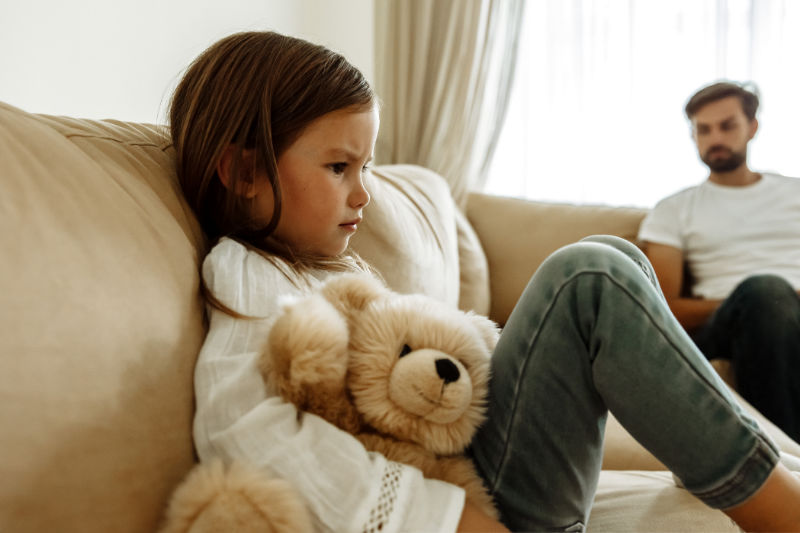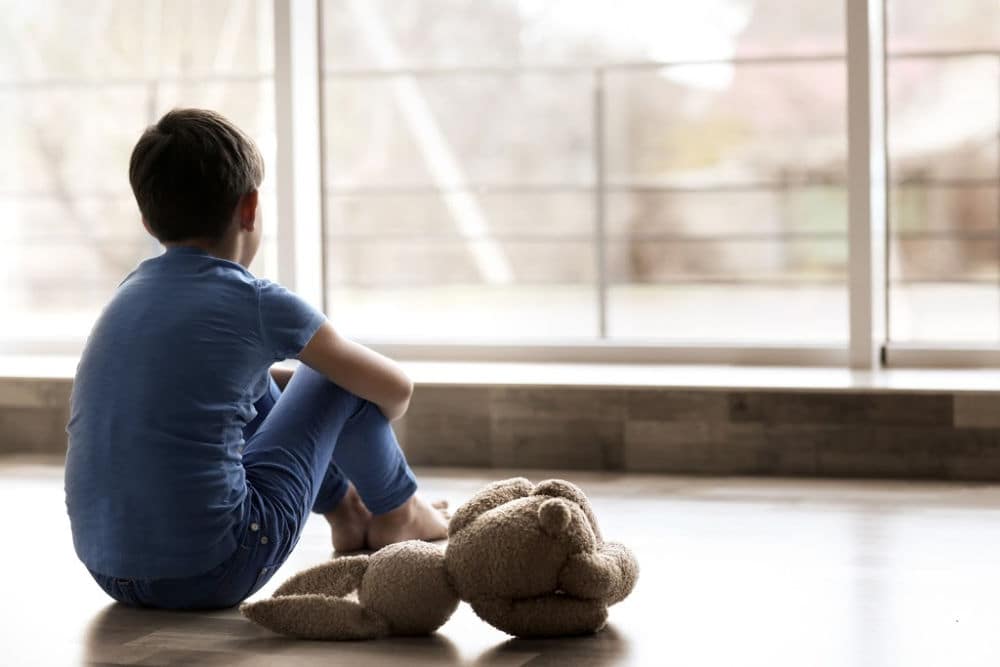Research has shown certain consequences for kids undermine the goal of raising good children. However, natural and logical consequences are invaluable ways to teach children. Learn more below.
First, there was a pop! Then a snap! My ears were already ringing from screaming and now it sounded like a cap gun was going off around me.
Making matters worse is that I was driving in terrible traffic.
I white-knuckled the steering wheel and impelled myself to take deep breaths.
We had just had one of the best days and now my children were acting out.
My brother had sent a text asking us to come downtown. With no plans for the day, we were in! We met him walking his dogs along the seawall. For the next while, we meandered between the city’s skyscrapers and the ocean soaking up the sun.
That’s when my kids spotted rainbow-painted aqua busses going from the seawall to various tourist locations in the city.
In minutes, we had piled two dogs, a stroller and three kids into the water taxi and off to a peninsula filled with artisan kid stores, a farmer’s market, and a waterpark.
After eating their fill of cheese and pepperoni pizza, my brother took the kids to a magic shop filled with rubber dog poop and faux candy. Out they came clutching brown paper bags, beaming.
Then, we headed to the splash pad to ride the free water slide. The day was what the best memories are made of.
For the next hour or so, my two oldest kids mounted the wet wooden staircase to slide as much as their hearts’ desired.
That’s when it hit me…
Though the day could not have been better, my timing was less than perfect. If we didn’t leave then, we would hit the worst of rush hour traffic.

Despite our scramble back to the aqua bus, making the uphill climb to my brother’s apartment at record speed, by the time my children and I hit the highway, we were hit by a wall of gridlock.
That’s when my two older children started roughhousing and squealing at decibel levels that left my ears ringing.
Then, I heard a pop.
Then another pop followed by maniacal laughter. It turns out that at the magic shop, they bought Snappers – little paper tricks that sound like a cap gun when you throw them. And they were doing just that – they were throwing them everywhere.
In the past, I might have yelled at my kids to be quiet.
In fact, at that moment everything in me wanted to scream. Had I not been deep breathing, I likely would have yelled and threatened some sort of arbitrary consequence like, “If you don’t quiet down right now, there will be no dessert!”
For the longest time, I didn’t know how to execute discipline any better. So, there were times my emotions got the best of me.
But I’m slowly learning to change my ways because, the truth is, this approach isn’t all that great.
Read: How to execute positive parenting from a position of strength
The research about arbitrary consequences and yelling is clear.
Though these punishments may work in the short term, these parenting practices are problematic.
In the short term, my kids may panic when I yell and threaten the loss of dessert and do everything to ensure they get ice cream.
Over the long term, however, research shows this quick fix falls apart.
In an analysis of studies on moral development, researchers found that parents who overpower, are negative, prone to conflict and/or sarcastic with their children have children with less mature moral reasoning. Additionally, a six-year study showed that mothers who were angry and generally used physical or verbal pressure on their children had children showed less internalized moral reasoning, less mature moral cognitions and poorer behaviour.
It’s important to note that this doesn’t mean that if a child is forced or a parent is angry that the child’s moral development will be impacted. Children are resilient and parents are human and will make mistakes. What it does mean is that parents who favour the use of force and threats risk impeding moral development.
This means that the more I threaten to take away dessert from my children or tell them the neighbourhood kids can’t come over and play for the next week, the more I will need to use threats like this in the future.
On top of this, research shows that children of more punitive mothers were more resentful and were more likely to reject her rules in the future.
But arbitrary punishments are easier to use than other forms of discipline.
Threatening, scolding, or grounding are more of a one-size-fits-all approach. They use fear instead of problem-solving and logic.
Naturally, taking the time to figure out the source of the behaviour, addressing it calmly and problem-solving takes more effort than responding out of anger. Because of this, it can be challenging to let go of what feels like a quick fix to a problem to forms of discipline that take perspective, patience, and practice. Additionally, it can feel almost instinctive to use arbitrary punishments. It’s how so many of us were raised and often it’s what society expects of us: to come up with some sort of awful deterrent so an undesirable behaviour never happens again.
Read: Scolding undermines effective parenting. This is why (and what to do instead).
But the truth is these punishments can have detrimental implications for children (and their parents too).
For one, it models aggressive behaviour and can hurt the relationship between the parent and child. As previously mentioned, research shows children tend to resent overly strict parents. On top of that, the quality of the parent-child relationship is related to how likely children are to display aggressive behaviour, have mental health disorders, and resist peer pressure.
It is important to note that this doesn’t mean a parent should avoid punishing their child for fear the child will no longer be their friend. The goal of parenting is not to be a child’s best friend but to teach children to embody their values and become well-adjusted members of society.
Research on adolescent outcomes shows that parents who focused on being calm during conflict, reframing difficult behaviour, and problem-solving had teenagers who showed fewer behavioural and emotional difficulties. In contrast, inconsistent, overly strict, or permissive parents are more likely to have children who engage in risky and/or aggressive behaviours.
Research: Parents need to approach difficult behaviour calmly and with respect for the child.
Based on these extensive findings the most effective discipline for children involves:
- setting clear rules and expectations
- perspective-taking – specifically listening to everyone’s side and understanding how everyone feels
- problem-solving when everyone is calm
- using courteous language
- using disciplinary tactics that would be appropriate for the child to emulate themselves – no hitting, shouting, shaming, or negative character attributions
Not all consequences are created equally.
Though it is beneficial for parents to drop threats and force, children need to understand the consequences of their actions. Research shows there are two more effective ways of approaching consequences for kids – they are natural or logical.
Natural consequences stem directly from a child’s behaviour. This means the parents do not impose or reinforce them in any way.
Some examples of natural consequences include:
- When children don’t want to wear their jackets, they get wet or cold. I often tell my kids to stand outside for a while and make a decision.
- Not taking care of belongings and either losing them or them breaking. Recently, we were away at a family wedding. When we were leaving, my daughter decided not to follow my suggestion of going through the hotel room to make sure she had her toys. Though I did a thorough check under the beds and in drawers, I didn’t know she had wrapped her LOL dolls in a hotel towel in the bathroom. As a result, she lost all of her favourite dolls. (I did call lost and found but they never showed up.) Instead of replacing them, as she asked, we are encouraging her to save money to replace them.
- Engaging in behaviour that will likely get someone hurt. For example, there are times when my children are roughhousing and the play is getting too rough. If I tell them to find something else to do or change the way they’re playing and someone gets hurt, that’s a natural consequence
Read: How to Discipline a Child: Why science says this is the best approach
Unlike natural consequences, parents impose logical consequences.
While arbitrary consequences may take a one-size-fits-all approach, logical ones are directly tied to the child’s behaviour, take into account the child’s perspective, and are proportionate to what has happened.
The consequences, which must be natural and logical to the disurbance of order, are self-evident and, therefore, come into play only as long as the child disregards order. It is order and reality by itself, not the arbitraty power of the adult which brings about the unpleasant consequence.
Dreikurs, 1994
In a literary review on logical consequences, there are two examples used to illustrate the quote above. To highlight arbitrary consequences, the author gives the example of a child hitting his sibling and losing screen time. This isn’t related to what the child has done and is related to arbitrary power. In contrast, a logical consequence is if, when a young girl plays in the front yard she runs into the street, she is told to only play in the backyard.
Some other examples of logical consequences include:
- When a child has coloured on walls, they need to wash the walls.
- Paying for an item the child has broken with allowance money or fixing that item.
- Losing the use of scissors temporarily if they are using them in an unsafe way.
- Going to their bedroom to calm down after an argument with a sibling before returning to problem-solve or communicate calmly.
- Not being allowed to play with friends until all chores are done.
- Or, delaying anything fun until homework is done, rooms are clean, and everyone is listening.
To execute logical consequences, it helps to pause, breathe and reflect.
It is pertinent to answer the following questions:
- What is going on?
- What happened leading up to this?
- How is everyone feeling?
Often the last question needs to be answered first.
The day we hit traffic and my children’s behaviour deteriorated, I pulled to the side of the road and turned on my hazard lights. “I cannot drive safely with people screaming. I will wait as long as it takes for everyone to be calm.”
The truth is, I was about to come unhinged. Traffic is triggering enough without children misbehaving.
I put my hazard lights on and started deep breathing.
It took about a minute, but the screaming stopped.
It was clear what was going on.
I knew they were overstimulated and probably a bit tired too.
“I get it. It’s been a long day and we’ve had a lot of fun. Hitting traffic is no fun for anyone.” It felt like a win…
But that’s when I realized the mess the snappers had left. When my kids opened their boxes, little bits of sawdust flew all over the back seats.
As I made my way back onto the highway, I told them, “Before dinner tonight, you both have to vacuum up the mess you made.”
There was a little protest, but they agreed.
There are times when we can problem-solve in a more Socratic way. For example, maybe they think of ways to say sorry to a friend or fix a broken toy. But in this instance, I chose to direct them to what needed to be done.
The rest of the way home, they were mostly peaceful. And by dinner, they had cleaned out the car.
A final note about consequences for kids
Though this particular instance ended well, the truth is, allowing for natural consequences and executing logical ones takes patience and practice. I don’t get it right all the time or even close to all of the time. But my goal for myself is similar to the goal I have for my kids: when we make mistakes or lapses in judgment, we pause, reset, and get back on track.
More great articles that you may find helpful:
Using Positive Discipline Instead of Scolding Your Child
How to Discipline a Child: Gentle Parenting vs. Harsh Punishments














As always insightful, realistic and helpful!
I like how you tie in research and your real experiences!
So delighted to read your articles!
Deirdre
What an incredible resource. The simple and clear message is approachable and easy to understand. The connection to quality research and examples of application inspire commitment to the message and provide clear paths to implementation.
I will be using this article in my practice from now on.
Well done. Thank you from the counselling community and parents everywhere!
Hi! I’m a 1st grade teacher. I love this approach and do my best to follow this advice. I am wondering what would be a logical consequence for screaming or roughhousing in the classroom. I really can’t “pull over” and I can’t let them continue with the roughhousing until someone gets hurt. I have found that trying to implement logical consequences in the classroom with other people’s children can be very challenging! Thank you for your help!
Amy, thank you so much for your question. I feel as though in the classroom, separation from each other, either simply by preventing them from playing together in the classroom for a period of time through a non-exclusionary timeout – kids sitting to the side of the room. I hope that helps.
Wondering what a logical consequence would be for talking back? My 6 year old will often talk back when he doesn’t like what we are asking him to do or sometimes it even seems like there is no reason! I struggle with finding something that is a natural or logical consequence.
Thank you for the information! I am struggling with my six year old daughter with pushing limits and back talk. I ask her to come to dinner, pick up toys, her TV time is over, etc.. and I get “one more minute” after I have set timers, and reminded her. Any suggestions on logical consequences would be great. Also for back talk as well.
I don’t agree with this article at all. This is why children don’t have any respect these days for anyone or anything. You can teach with love and punish them. My parents used the old fashioned way of disciplining me and I’m grateful for the way they brought me up. I love them very much and don’t hold that against them. That’s how I brought up my boys and there never was a problem. My boys say that they will do the same. They respect people (and themselves), are responsible, have a ton of manners (not only ‘please’ and ‘thank you’) and are very caring and compassionate human beings.
I appreciate your comment and your perspective. It is wonderful that you raised such great children and also had such an incredible upbringing. Where we disagree is this. Countless studies find that the best way to teach respect is by modelling and coaching respect. Moreover, arbitrary consequences have a detrimental impact on children and their moral development when compared to kind, respectful guidance. Finally, one of the strongest ways to teach is by modelling. If we show our children respect and when they’re disrespectful present alternative ways of responding with respect, they learn without being forced. This actually leads to higher-level moral reasoning.
Drawing from something I’ve witnessed.
What if your child argues about the ‘whys’ of a logical consequence or demand? You can’t keep explaining everything on the spot…
I think one half of this style of parenting is excellent! I have used many of them. I did yell at my children (who are now 41, 44, and 47 years old). I yelled to be heard over the din. I yelled sometimes when I was mad. I also taught them to be themselves. ALWAYS! They all have excellent manners, work hard, are very respectful and responsible. Two of them have children and they are great!!! You have to prepare your kids for the real world. They will have people that yell at them. If I did it your way, they would be a puddle on the floor and very easily dominated. Don’t treat them as psychological experiments. They have to face the real world. I also taught them to yell. If a stranger tried anything…they were taught to YELL!!! I did have my basic rules and equally effective and Always followed up on discipline for everyone but I did treat each of my children as the individuals they are. I taught at-risk children (mostly teens) for over 20 years and very seldom did I ever need to discipline them. You’ve got to expect some backtalk. It’s a way for kids to learn to stand up for themselves.. The trick is to turn backtalk into conversation.
I like some of your ideas but I think you are not preparing them for the real world. I like Barbara Collorsso (sp?) and used her teachings when I taught a course for parents of at risk kids. Her methods though I find to be very cold and almost militaristic . My rules for bringing up children are; Make Reasonable rules and Always follow up on them immediately with Reasonable punishment. Teach your child to respect others And Themselves. There is No Such Thing as a Small Problem when it’s theirs. LOVE them UNCONDITIONALLY.
I really enjoyed reading your article. I am struggling with parenting my 4 year old daughter at times. She is one of my b/g twins. She doesn’t follow instructions well and I feel I become overbearing because she ignores you, won’t even acknowledge a request even when you’re certain she has heard you and understands the request. I’m just not sure what the consequences should be for this behavior. I am looking for any sort of help to alleviate my frustrations and have a better relationship with my daughter. We have introduced one on one special days to fill her cup, we try not to loose our temper with her and calm ourselves (which is not always successful!) and I am really trying to take different approaches when requesting she does something but I am struggling. Any thoughts?